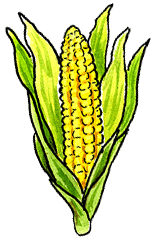Corn

Sweet corn that gets plunked into a pot of boiling water within moments after it has been picked, is one of life's great pleasures. But growing corn in a small backyard plot is a little challenging. Each corn plant typically produces no more than one or two ears of corn. At the recommended spacing of 2 plants per square foot, you might get about a dozen ears of corn in half of a 3x6 raised bed.
There's another challenge, too. Corn is wind-pollinated. To get ears with a full complement of kernels, you need to plant a block of same-variety corn plants that can pollinate one another. For good pollination, the minimum number of plants in such a block is about 18. This will occupy half of a 3x6 raised bed. If you love sweet corn and have enough garden space available, by all means, give it a try.
There are four kinds of eating corn: old-fashioned sweet corn, sugar-enhanced sweet corn, synergistic corn and supersweet corn. The latter is the type most commonly sold in grocery stores because it's able to retain its quality and flavor for several days, particularly if it is kept refrigerated. Gardeners in northern climates should be cautious about planting supersweets because they do not grow well in cool soils. Supersweet varieties must also be grown separately from non-supersweet varieties. If the two types cross pollinate, the result will be tough, starchy kernels.
Sow corn seeds once the soil warms up to about 60 degrees F and any danger of frost has passed. Plant 4 seeds per square foot and then thin to 2 seeds per square foot. Planting corn this densely will yield smaller than normal ears, but will improve pollination and the quality of your harvest.
Native Americans traditionally grew corn, bean and winter squash together, and you might want to give that a try. Plant pole beans after the corn is a foot tall — two seeds per corn plant, thinning out one plant if both seeds come up. If you grow about 9 sq. ft. of corn in your raised bed, there will be room for a few squash plants in the middle; squash vines are generally prickly, which helps discourage raccoons from stealing ripening corn.
Corn is a large plant and it requires lots of nitrogen to produce all that biomass. For healthy growth, be sure to prepare the planting area by adding extra compost and organic fertilizer. To maintain vigorous growth, side-dress your corn plants midseason with additional compost or organic fertilizer.
Print this Article:
Get the Dirt
Stay up to date on new articles and advice. Please fill out the information below.
